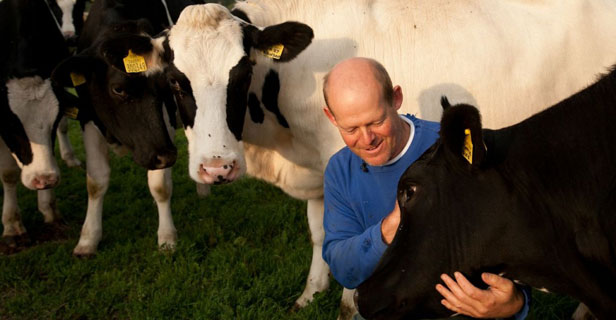
Each cow looked after by British farmer, Stephen Hook, has a name and he is particularly fond of Ida. The documentary 'The Moo Man' follows the life of Stephen Hook on his dairy farm. Accompanying him during his day to day work, the film shows calves being born, sick cows being taken care of and what happens when they die. Stephen is truly enthusiastic about his family business but he is also aware of the challenges he is facing. The milk price has fallen so low he can hardly earn enough money to sustain his farm. In order to make his living, Stephen and his family are now offering services like home delivery. On average farmers in the United Kingdom work 60 to 70 hours per week and young people nowadays prefer to find other jobs which are better paid with shorter working hours.
Director Andy Heathcote and co-director Heike Bachelier succeed in showing how a 'simpler' lifestyle can lead to success and being in harmony with the natural surroundings.
The movie was screened on 24 February 2014 by the United Nations Information Service (UNIS Vienna) in cooperation with this human world (THW) Film Festival and Topkino. The screening marked the International Year of Family Farming and was part of the regular film screenings by Ciné-ONUVienna.
The film was followed by a panel discussion, which featured Elisabeth Sötz (Adviser for the Environment and Natural Resources, Austrian Development Agency), Nikolaus Morawitz (Head of European Union & International Affairs, Austrian Chamber of Agriculture) Frank Hartwich (Industrial Development Officer, United Nations Industrial Development Organization) and Janos Tisovszky (Director of UNIS Vienna).
Highlighting the International Year of Family Farming, the discussion evolved around the challenges those farms are facing. The topic is relevant to all of us as we are all consumers of farm products, even if we buy our food from supermarkets. Worldwide about 90 per cent of the population have some connection to farming.
One crucial point raised in the discussion was how farms in Europe are different from those in other continents. Whilst the support for family farms is an important element of poverty reduction strategies, it cannot be the only solution. Climate change and soil degradation are serious challenges for family farms, especially in the developing countries. While new technology can be a tool for farmers, they also need to know how to use it.
The idea of converting family farms into tourist destinations might be a solution in terms of income generation for some farms in places such as Austria, but tourism will not be able to ensure the sustainability of farms in general.